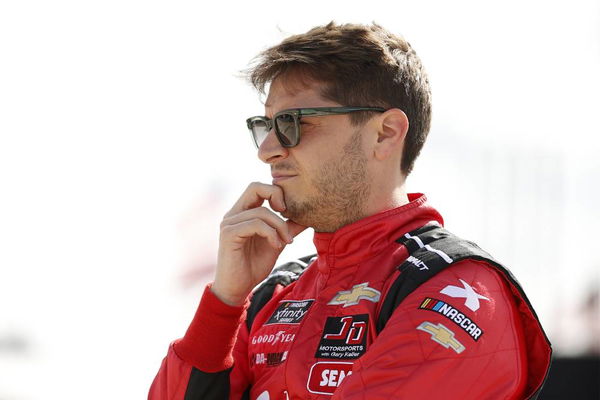

“Be smart out there.” That was Toni Breidinger’s parting shot to fans recently after she exposed a wave of fake social media accounts impersonating her. “There are 100000000 fake accounts of me,” she tweeted, warning her followers to steer clear of scams involving secret fan pages, VIP cards, and money requests. “I will never ask you for money,” she stressed, adding that even her management wouldn’t.
It’s a stark reminder that in today’s digital age, not even racecar drivers are safe from social media impersonators and neither are their fans. But while Toni issued a serious PSA, another NASCAR name recently got caught up in an online mishap of a very different kind. Let’s just say when you mix satire with speed, you’re bound to get a little duped. Or in Landon Cassill’s case… hilariously so.
“You have been duped on the internet.” That’s how Parker Kligerman opened a recent NASCAR podcast episode, calling out Landon Cassill for his innocent yet hilarious misstep. The situation? A viral post claiming Talladega had banned the number eight—a piece of fake email that Cassill mistook for the real deal, prompting his now-infamous comment: “Lol, great job Talladega marketing department.”
ADVERTISEMENT
Article continues below this ad
The spoof mail that fooled Cassill was, in fact, playing on the recent trademark dispute between Dale Earnhardt Jr. and Lamar Jackson over the use of the number 8. Baltimore Ravens quarterback Lamar Jackson filed an opposition with the U.S. Patent and Trademark Office against Earnhardt Jr.’s attempt to trademark a stylized version of the No. 8, claiming it could confuse with his own “ERA 8” brand. In response, Earnhardt Jr. announced he would use a different stylized version of the number to avoid potential conflict. The issue was finally resolved.
While a joke to some, it was just convincing enough to throw off even a seasoned driver like Cassill. “Well, it’s exactly what I meant,” he said, sticking to his guns even as the Talladega account publicly denied involvement: “Oh, it definitely wasn’t us.” It wasn’t the first time Cassill fell for online shenanigans.
View this post on Instagram
“Was it not Adam Slern or Downforded that got you one time?” Kligerman prodded. Cassill recalled, “I think it was Adam Slern,” referring to a parody account of a NASCAR journalist. These satirical outlets blur lines with well-designed graphics and copycat usernames, making slip-ups easy, even for insiders like Cassill.
Cassill’s mishap is a lighthearted example of how digital misinformation can trip up even tech-savvy pros. It also underscores a larger trend: fake news and parody content are rampant in sports media. Studies show that over 60% of users sometimes share articles without reading past the headlines, fueling viral missteps like this one.
What’s your perspective on:
Landon Cassill's online blunder—harmless fun or a sign of a bigger issue in sports media?
Have an interesting take?
Still, Cassill’s response proved why he’s a fan favorite. Instead of getting defensive, he leaned into the joke. “I am still trying to figure out why everybody is so certain that I got duped here,” he quipped. In an era of keyboard outrage, Cassill’s ability to laugh at himself turned a digital gaffe into a comedic highlight of the week.
ADVERTISEMENT
Article continues below this ad
Why the NASCAR community is a prime target for online scams
The NASCAR community, with its loyal, tight-knit fan base and deeply personal driver-fan relationships, has unknowingly become fertile ground for online scammers. Unlike many other sports, NASCAR thrives on access. Fans aren’t just spectators. They follow drivers across social platforms, interact with them in comment sections, and even contribute to crowdfunding efforts. That closeness, while admirable, makes them vulnerable.
Additionally, many NASCAR fans and participants are everyday workers. These include essential workers, military personnel, and teachers, who may have limited financial resources but strong aspirations. This situation makes them vulnerable to schemes promising financial relief or exclusive opportunities. The community’s enthusiasm for exclusive experiences like meet-and-greets, memorabilia, or race-related offers can be manipulated by fraudsters posing as insiders or team representatives.
The decentralized nature of NASCAR teams and fan interactions also contributes to vulnerability. Unlike some sports with centralized ticketing or merchandise sales, NASCAR’s diverse network of teams, sponsors, and fan groups can make it harder for fans to verify authenticity, increasing the risk of falling for counterfeit goods or fake events.
ADVERTISEMENT
Article continues below this ad
The solution? A mix of media literacy, platform accountability, and consistent messaging from teams and drivers. As Toni Breidinger put it, “Be smart out there.” Because while the racetrack may be high-speed, the internet’s full of pitfalls, and the checkered flag should never come at the cost of trust.
ADVERTISEMENT
ADVERTISEMENT
ADVERTISEMENT
ADVERTISEMENT


"Landon Cassill's online blunder—harmless fun or a sign of a bigger issue in sports media?"